Report on Business Law: Sources, Legislation, and Court Structure
VerifiedAdded on 2021/02/19
|8
|2161
|101
Report
AI Summary
This report provides a comprehensive overview of UK business law, starting with an introduction to its significance and scope. It details the various sources of law in the UK, including primary legislation, delegated legislation, common law, EU law, and the European Convention on Human Rights. The report then delves into delegated legislation, explaining its role and function. A significant portion is dedicated to the hierarchy of courts in the UK, outlining the roles and responsibilities of the Supreme Court, Court of Appeal, High Court, County Courts, and Tribunals. Finally, the report analyzes the potential impact of company law, employment law, and contract law on businesses, highlighting how these legal areas can affect a company's operations, reputation, and financial performance. The report concludes by emphasizing the crucial role business law plays in governing the country and its impact on the business environment.
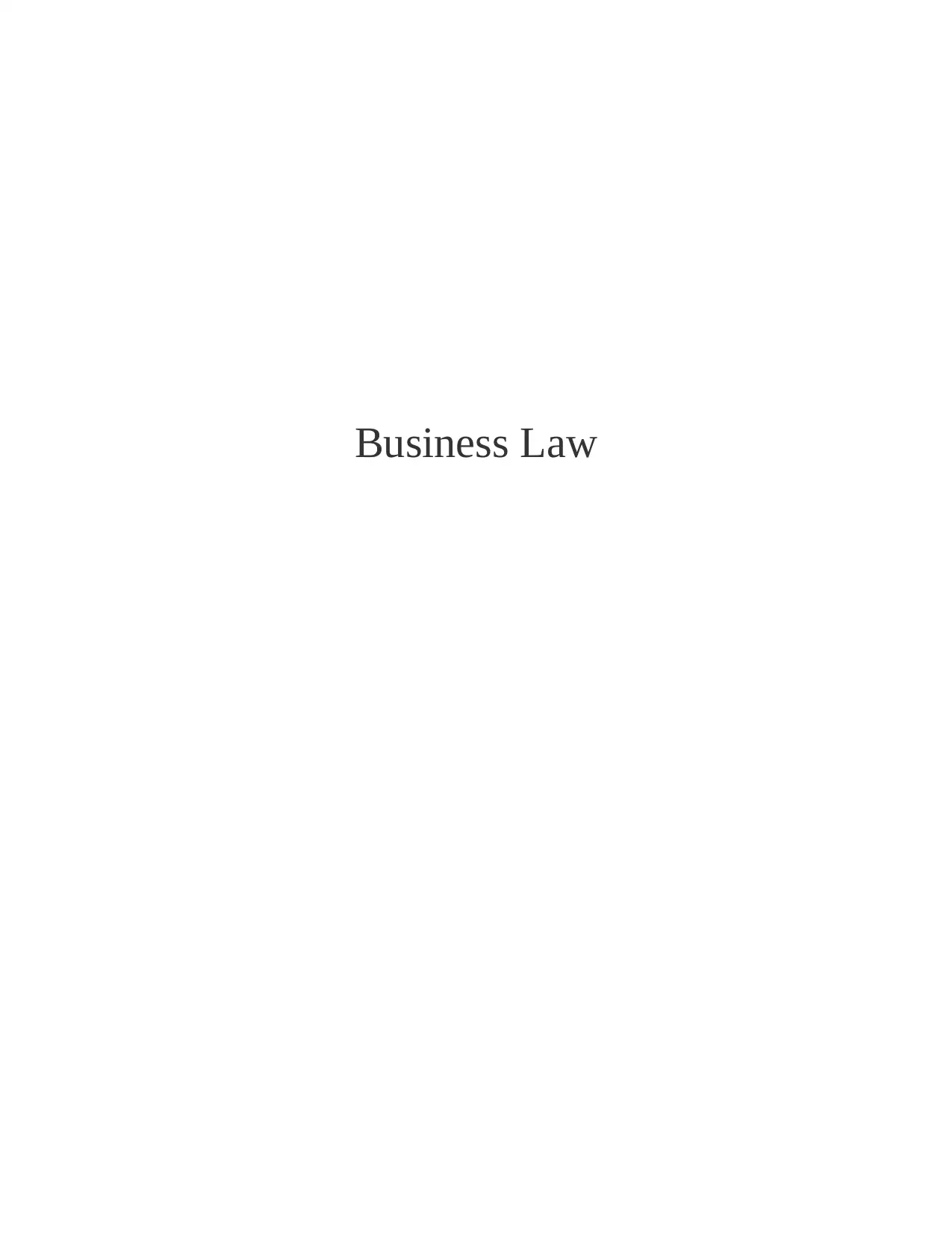
Business Law
Paraphrase This Document
Need a fresh take? Get an instant paraphrase of this document with our AI Paraphraser
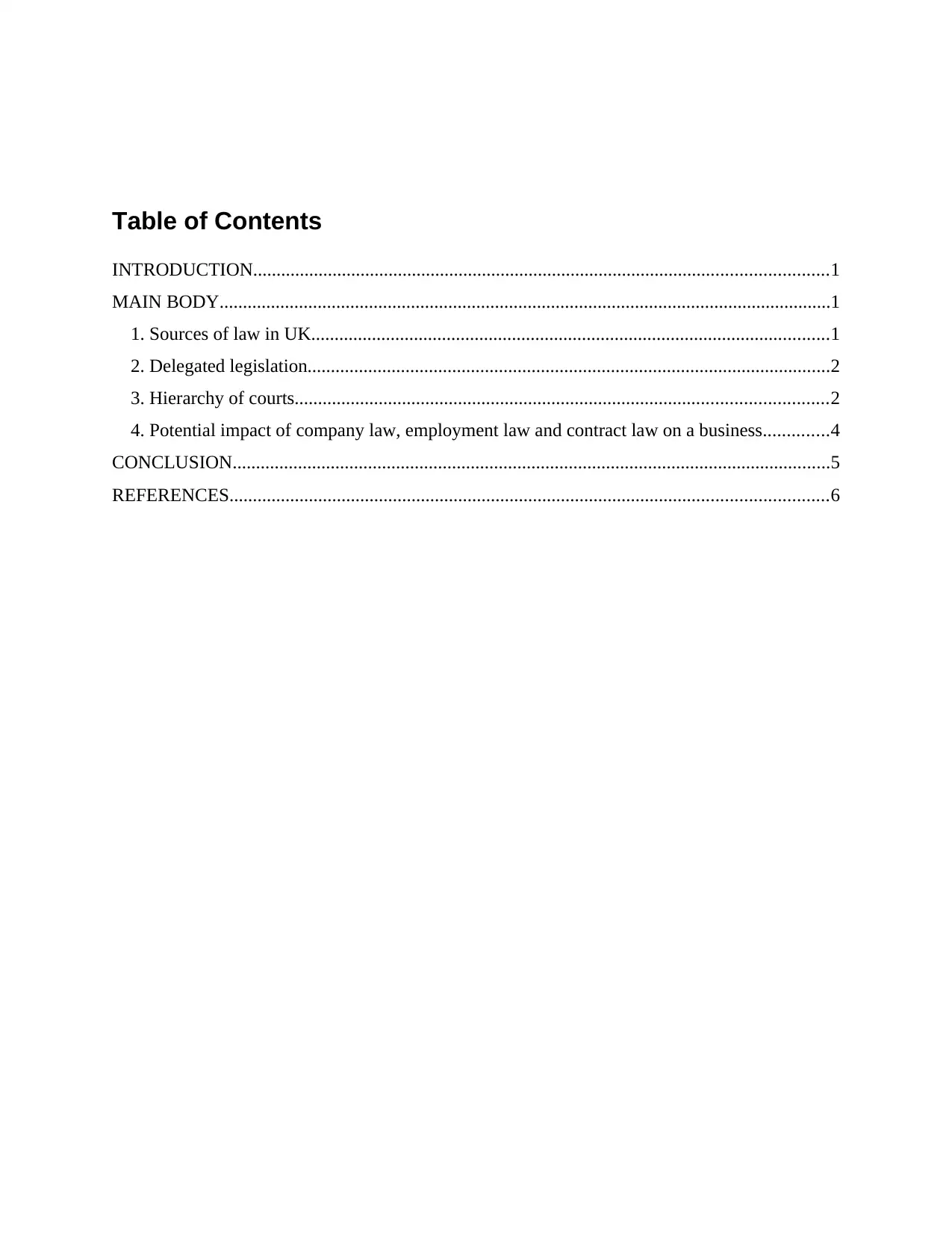
Table of Contents
INTRODUCTION...........................................................................................................................1
MAIN BODY...................................................................................................................................1
1. Sources of law in UK...............................................................................................................1
2. Delegated legislation................................................................................................................2
3. Hierarchy of courts..................................................................................................................2
4. Potential impact of company law, employment law and contract law on a business..............4
CONCLUSION................................................................................................................................5
REFERENCES................................................................................................................................6
INTRODUCTION...........................................................................................................................1
MAIN BODY...................................................................................................................................1
1. Sources of law in UK...............................................................................................................1
2. Delegated legislation................................................................................................................2
3. Hierarchy of courts..................................................................................................................2
4. Potential impact of company law, employment law and contract law on a business..............4
CONCLUSION................................................................................................................................5
REFERENCES................................................................................................................................6
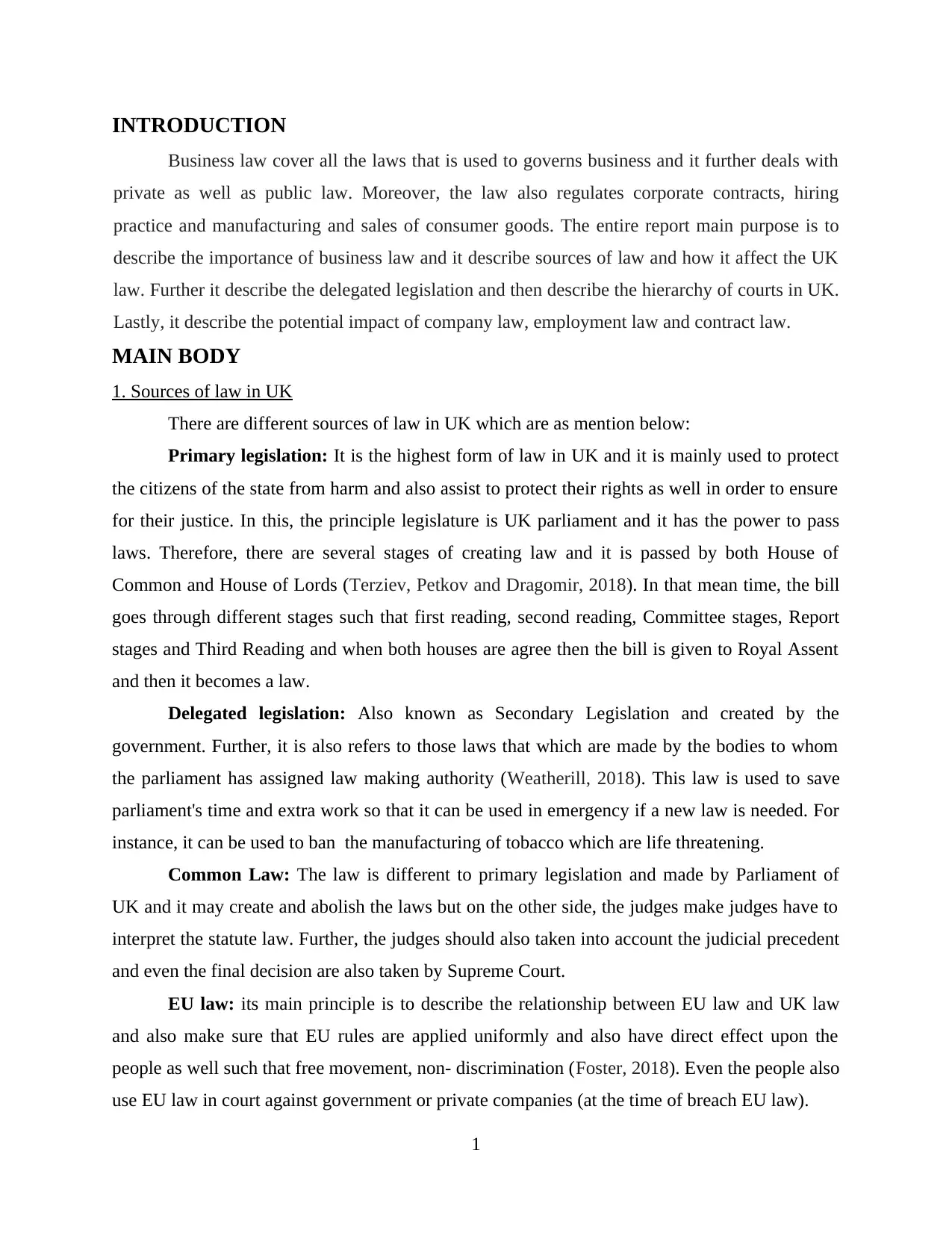
INTRODUCTION
Business law cover all the laws that is used to governs business and it further deals with
private as well as public law. Moreover, the law also regulates corporate contracts, hiring
practice and manufacturing and sales of consumer goods. The entire report main purpose is to
describe the importance of business law and it describe sources of law and how it affect the UK
law. Further it describe the delegated legislation and then describe the hierarchy of courts in UK.
Lastly, it describe the potential impact of company law, employment law and contract law.
MAIN BODY
1. Sources of law in UK
There are different sources of law in UK which are as mention below:
Primary legislation: It is the highest form of law in UK and it is mainly used to protect
the citizens of the state from harm and also assist to protect their rights as well in order to ensure
for their justice. In this, the principle legislature is UK parliament and it has the power to pass
laws. Therefore, there are several stages of creating law and it is passed by both House of
Common and House of Lords (Terziev, Petkov and Dragomir, 2018). In that mean time, the bill
goes through different stages such that first reading, second reading, Committee stages, Report
stages and Third Reading and when both houses are agree then the bill is given to Royal Assent
and then it becomes a law.
Delegated legislation: Also known as Secondary Legislation and created by the
government. Further, it is also refers to those laws that which are made by the bodies to whom
the parliament has assigned law making authority (Weatherill, 2018). This law is used to save
parliament's time and extra work so that it can be used in emergency if a new law is needed. For
instance, it can be used to ban the manufacturing of tobacco which are life threatening.
Common Law: The law is different to primary legislation and made by Parliament of
UK and it may create and abolish the laws but on the other side, the judges make judges have to
interpret the statute law. Further, the judges should also taken into account the judicial precedent
and even the final decision are also taken by Supreme Court.
EU law: its main principle is to describe the relationship between EU law and UK law
and also make sure that EU rules are applied uniformly and also have direct effect upon the
people as well such that free movement, non- discrimination (Foster, 2018). Even the people also
use EU law in court against government or private companies (at the time of breach EU law).
1
Business law cover all the laws that is used to governs business and it further deals with
private as well as public law. Moreover, the law also regulates corporate contracts, hiring
practice and manufacturing and sales of consumer goods. The entire report main purpose is to
describe the importance of business law and it describe sources of law and how it affect the UK
law. Further it describe the delegated legislation and then describe the hierarchy of courts in UK.
Lastly, it describe the potential impact of company law, employment law and contract law.
MAIN BODY
1. Sources of law in UK
There are different sources of law in UK which are as mention below:
Primary legislation: It is the highest form of law in UK and it is mainly used to protect
the citizens of the state from harm and also assist to protect their rights as well in order to ensure
for their justice. In this, the principle legislature is UK parliament and it has the power to pass
laws. Therefore, there are several stages of creating law and it is passed by both House of
Common and House of Lords (Terziev, Petkov and Dragomir, 2018). In that mean time, the bill
goes through different stages such that first reading, second reading, Committee stages, Report
stages and Third Reading and when both houses are agree then the bill is given to Royal Assent
and then it becomes a law.
Delegated legislation: Also known as Secondary Legislation and created by the
government. Further, it is also refers to those laws that which are made by the bodies to whom
the parliament has assigned law making authority (Weatherill, 2018). This law is used to save
parliament's time and extra work so that it can be used in emergency if a new law is needed. For
instance, it can be used to ban the manufacturing of tobacco which are life threatening.
Common Law: The law is different to primary legislation and made by Parliament of
UK and it may create and abolish the laws but on the other side, the judges make judges have to
interpret the statute law. Further, the judges should also taken into account the judicial precedent
and even the final decision are also taken by Supreme Court.
EU law: its main principle is to describe the relationship between EU law and UK law
and also make sure that EU rules are applied uniformly and also have direct effect upon the
people as well such that free movement, non- discrimination (Foster, 2018). Even the people also
use EU law in court against government or private companies (at the time of breach EU law).
1
⊘ This is a preview!⊘
Do you want full access?
Subscribe today to unlock all pages.

Trusted by 1+ million students worldwide
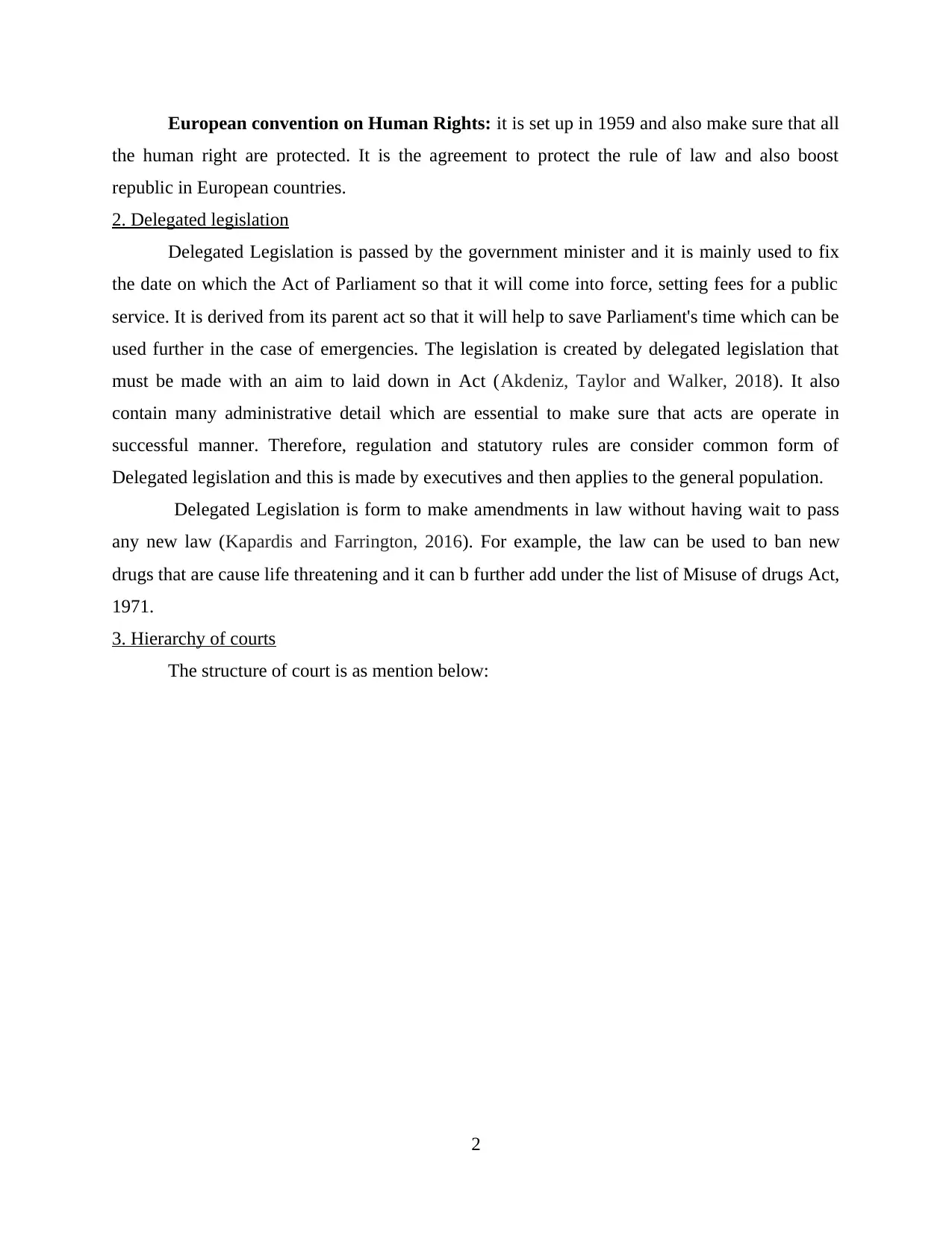
European convention on Human Rights: it is set up in 1959 and also make sure that all
the human right are protected. It is the agreement to protect the rule of law and also boost
republic in European countries.
2. Delegated legislation
Delegated Legislation is passed by the government minister and it is mainly used to fix
the date on which the Act of Parliament so that it will come into force, setting fees for a public
service. It is derived from its parent act so that it will help to save Parliament's time which can be
used further in the case of emergencies. The legislation is created by delegated legislation that
must be made with an aim to laid down in Act (Akdeniz, Taylor and Walker, 2018). It also
contain many administrative detail which are essential to make sure that acts are operate in
successful manner. Therefore, regulation and statutory rules are consider common form of
Delegated legislation and this is made by executives and then applies to the general population.
Delegated Legislation is form to make amendments in law without having wait to pass
any new law (Kapardis and Farrington, 2016). For example, the law can be used to ban new
drugs that are cause life threatening and it can b further add under the list of Misuse of drugs Act,
1971.
3. Hierarchy of courts
The structure of court is as mention below:
2
the human right are protected. It is the agreement to protect the rule of law and also boost
republic in European countries.
2. Delegated legislation
Delegated Legislation is passed by the government minister and it is mainly used to fix
the date on which the Act of Parliament so that it will come into force, setting fees for a public
service. It is derived from its parent act so that it will help to save Parliament's time which can be
used further in the case of emergencies. The legislation is created by delegated legislation that
must be made with an aim to laid down in Act (Akdeniz, Taylor and Walker, 2018). It also
contain many administrative detail which are essential to make sure that acts are operate in
successful manner. Therefore, regulation and statutory rules are consider common form of
Delegated legislation and this is made by executives and then applies to the general population.
Delegated Legislation is form to make amendments in law without having wait to pass
any new law (Kapardis and Farrington, 2016). For example, the law can be used to ban new
drugs that are cause life threatening and it can b further add under the list of Misuse of drugs Act,
1971.
3. Hierarchy of courts
The structure of court is as mention below:
2
Paraphrase This Document
Need a fresh take? Get an instant paraphrase of this document with our AI Paraphraser
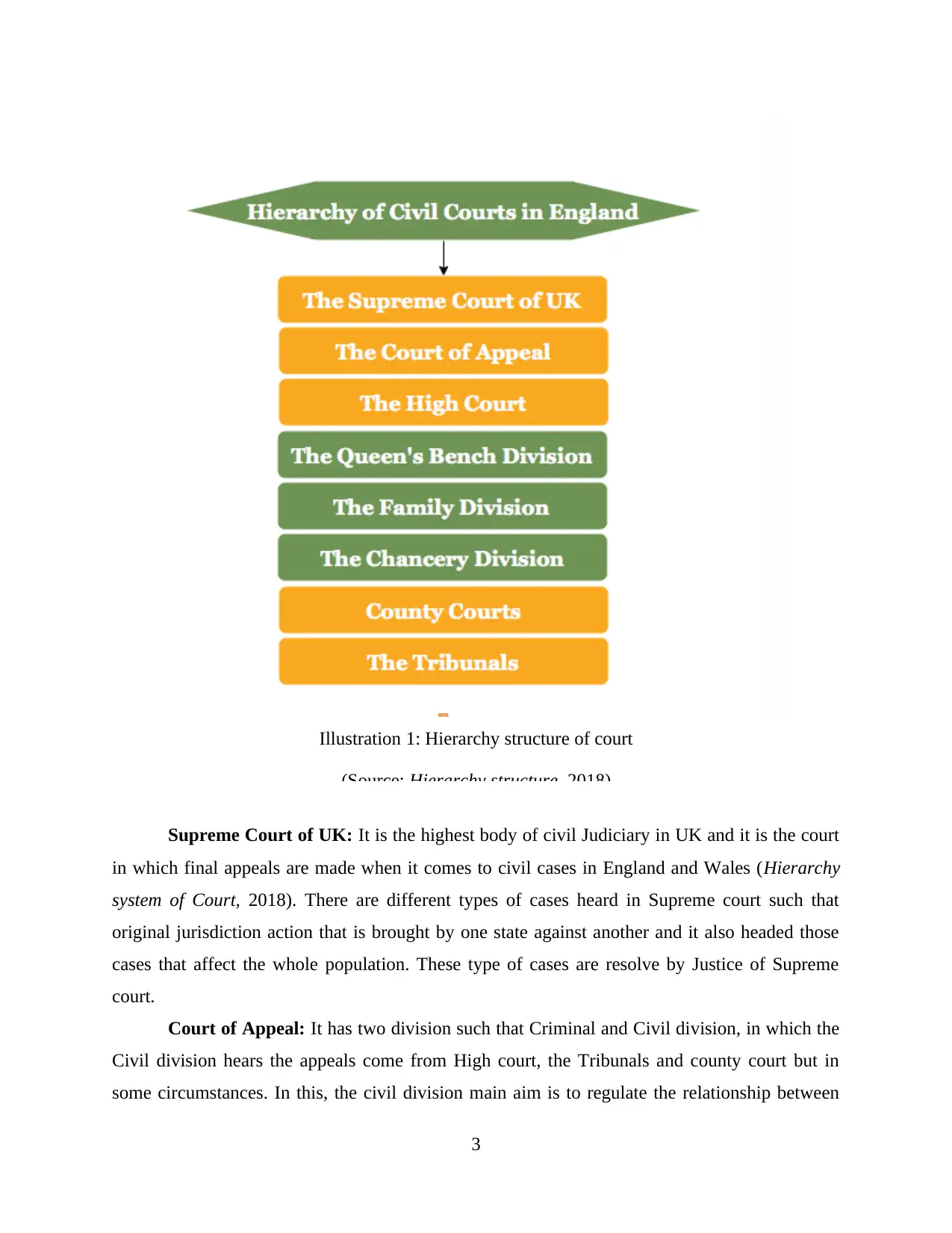
Supreme Court of UK: It is the highest body of civil Judiciary in UK and it is the court
in which final appeals are made when it comes to civil cases in England and Wales (Hierarchy
system of Court, 2018). There are different types of cases heard in Supreme court such that
original jurisdiction action that is brought by one state against another and it also headed those
cases that affect the whole population. These type of cases are resolve by Justice of Supreme
court.
Court of Appeal: It has two division such that Criminal and Civil division, in which the
Civil division hears the appeals come from High court, the Tribunals and county court but in
some circumstances. In this, the civil division main aim is to regulate the relationship between
3
Illustration 1: Hierarchy structure of court
(Source: Hierarchy structure, 2018)
in which final appeals are made when it comes to civil cases in England and Wales (Hierarchy
system of Court, 2018). There are different types of cases heard in Supreme court such that
original jurisdiction action that is brought by one state against another and it also headed those
cases that affect the whole population. These type of cases are resolve by Justice of Supreme
court.
Court of Appeal: It has two division such that Criminal and Civil division, in which the
Civil division hears the appeals come from High court, the Tribunals and county court but in
some circumstances. In this, the civil division main aim is to regulate the relationship between
3
Illustration 1: Hierarchy structure of court
(Source: Hierarchy structure, 2018)
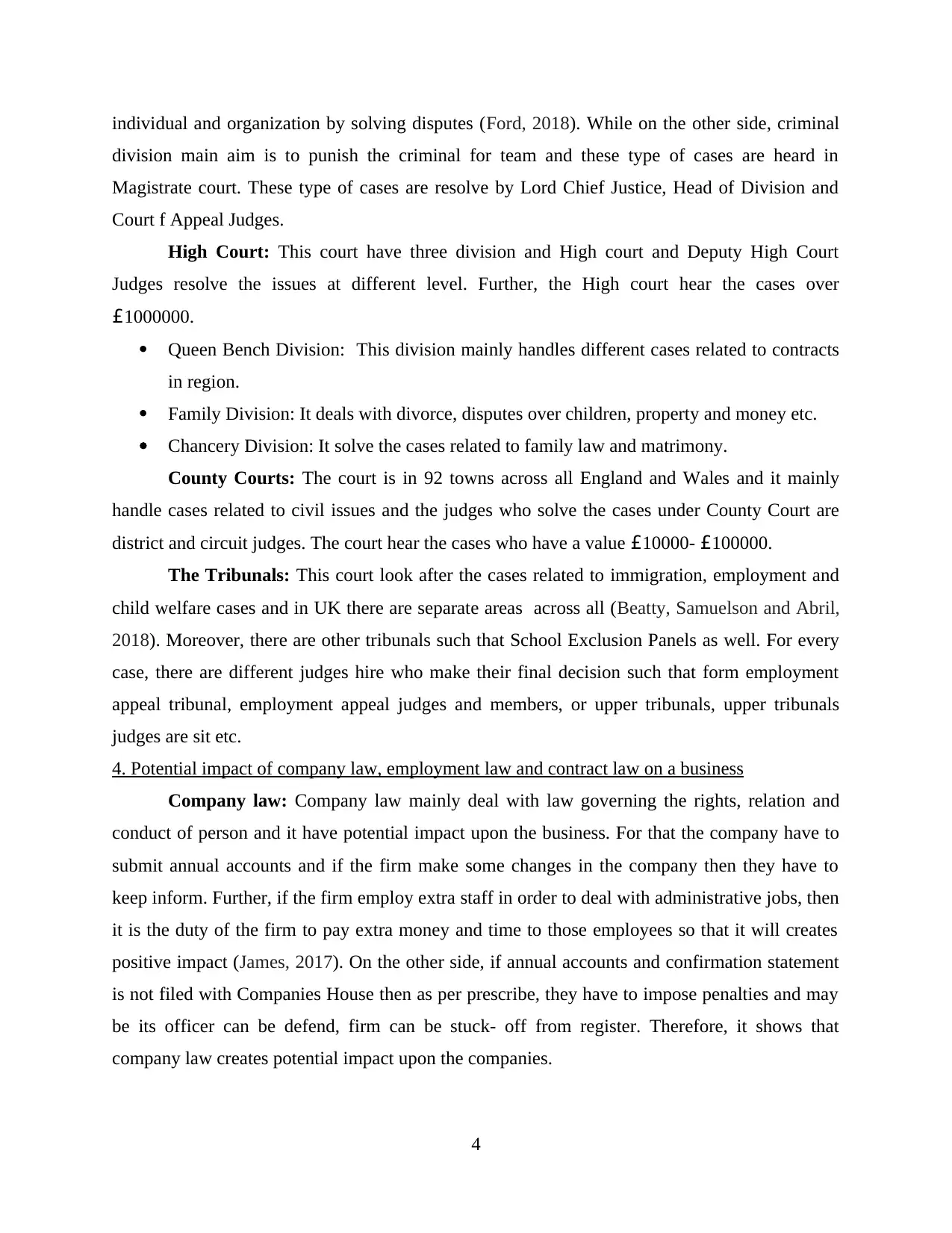
individual and organization by solving disputes (Ford, 2018). While on the other side, criminal
division main aim is to punish the criminal for team and these type of cases are heard in
Magistrate court. These type of cases are resolve by Lord Chief Justice, Head of Division and
Court f Appeal Judges.
High Court: This court have three division and High court and Deputy High Court
Judges resolve the issues at different level. Further, the High court hear the cases over
£1000000.
Queen Bench Division: This division mainly handles different cases related to contracts
in region.
Family Division: It deals with divorce, disputes over children, property and money etc.
Chancery Division: It solve the cases related to family law and matrimony.
County Courts: The court is in 92 towns across all England and Wales and it mainly
handle cases related to civil issues and the judges who solve the cases under County Court are
district and circuit judges. The court hear the cases who have a value £10000- £100000.
The Tribunals: This court look after the cases related to immigration, employment and
child welfare cases and in UK there are separate areas across all (Beatty, Samuelson and Abril,
2018). Moreover, there are other tribunals such that School Exclusion Panels as well. For every
case, there are different judges hire who make their final decision such that form employment
appeal tribunal, employment appeal judges and members, or upper tribunals, upper tribunals
judges are sit etc.
4. Potential impact of company law, employment law and contract law on a business
Company law: Company law mainly deal with law governing the rights, relation and
conduct of person and it have potential impact upon the business. For that the company have to
submit annual accounts and if the firm make some changes in the company then they have to
keep inform. Further, if the firm employ extra staff in order to deal with administrative jobs, then
it is the duty of the firm to pay extra money and time to those employees so that it will creates
positive impact (James, 2017). On the other side, if annual accounts and confirmation statement
is not filed with Companies House then as per prescribe, they have to impose penalties and may
be its officer can be defend, firm can be stuck- off from register. Therefore, it shows that
company law creates potential impact upon the companies.
4
division main aim is to punish the criminal for team and these type of cases are heard in
Magistrate court. These type of cases are resolve by Lord Chief Justice, Head of Division and
Court f Appeal Judges.
High Court: This court have three division and High court and Deputy High Court
Judges resolve the issues at different level. Further, the High court hear the cases over
£1000000.
Queen Bench Division: This division mainly handles different cases related to contracts
in region.
Family Division: It deals with divorce, disputes over children, property and money etc.
Chancery Division: It solve the cases related to family law and matrimony.
County Courts: The court is in 92 towns across all England and Wales and it mainly
handle cases related to civil issues and the judges who solve the cases under County Court are
district and circuit judges. The court hear the cases who have a value £10000- £100000.
The Tribunals: This court look after the cases related to immigration, employment and
child welfare cases and in UK there are separate areas across all (Beatty, Samuelson and Abril,
2018). Moreover, there are other tribunals such that School Exclusion Panels as well. For every
case, there are different judges hire who make their final decision such that form employment
appeal tribunal, employment appeal judges and members, or upper tribunals, upper tribunals
judges are sit etc.
4. Potential impact of company law, employment law and contract law on a business
Company law: Company law mainly deal with law governing the rights, relation and
conduct of person and it have potential impact upon the business. For that the company have to
submit annual accounts and if the firm make some changes in the company then they have to
keep inform. Further, if the firm employ extra staff in order to deal with administrative jobs, then
it is the duty of the firm to pay extra money and time to those employees so that it will creates
positive impact (James, 2017). On the other side, if annual accounts and confirmation statement
is not filed with Companies House then as per prescribe, they have to impose penalties and may
be its officer can be defend, firm can be stuck- off from register. Therefore, it shows that
company law creates potential impact upon the companies.
4
⊘ This is a preview!⊘
Do you want full access?
Subscribe today to unlock all pages.

Trusted by 1+ million students worldwide
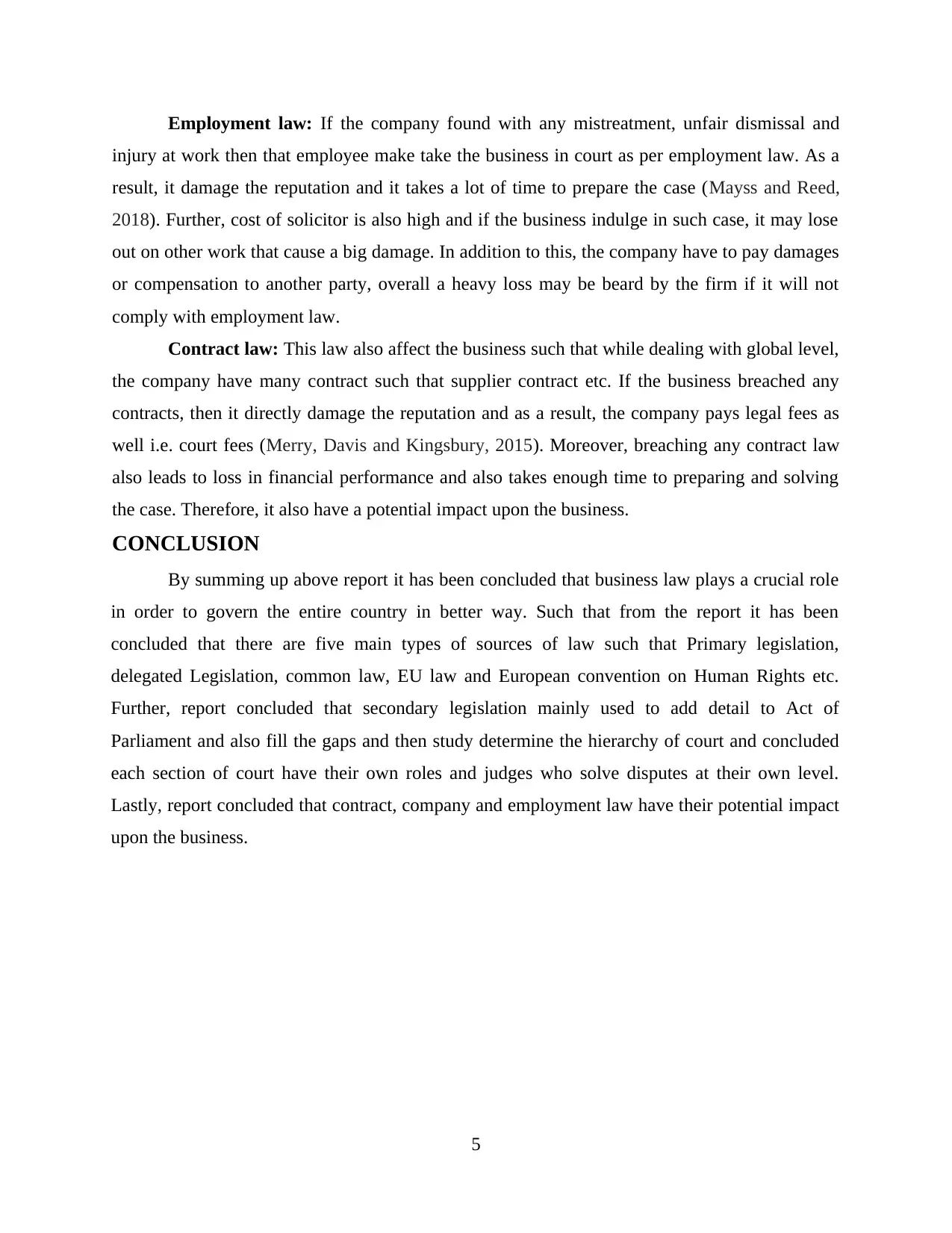
Employment law: If the company found with any mistreatment, unfair dismissal and
injury at work then that employee make take the business in court as per employment law. As a
result, it damage the reputation and it takes a lot of time to prepare the case (Mayss and Reed,
2018). Further, cost of solicitor is also high and if the business indulge in such case, it may lose
out on other work that cause a big damage. In addition to this, the company have to pay damages
or compensation to another party, overall a heavy loss may be beard by the firm if it will not
comply with employment law.
Contract law: This law also affect the business such that while dealing with global level,
the company have many contract such that supplier contract etc. If the business breached any
contracts, then it directly damage the reputation and as a result, the company pays legal fees as
well i.e. court fees (Merry, Davis and Kingsbury, 2015). Moreover, breaching any contract law
also leads to loss in financial performance and also takes enough time to preparing and solving
the case. Therefore, it also have a potential impact upon the business.
CONCLUSION
By summing up above report it has been concluded that business law plays a crucial role
in order to govern the entire country in better way. Such that from the report it has been
concluded that there are five main types of sources of law such that Primary legislation,
delegated Legislation, common law, EU law and European convention on Human Rights etc.
Further, report concluded that secondary legislation mainly used to add detail to Act of
Parliament and also fill the gaps and then study determine the hierarchy of court and concluded
each section of court have their own roles and judges who solve disputes at their own level.
Lastly, report concluded that contract, company and employment law have their potential impact
upon the business.
5
injury at work then that employee make take the business in court as per employment law. As a
result, it damage the reputation and it takes a lot of time to prepare the case (Mayss and Reed,
2018). Further, cost of solicitor is also high and if the business indulge in such case, it may lose
out on other work that cause a big damage. In addition to this, the company have to pay damages
or compensation to another party, overall a heavy loss may be beard by the firm if it will not
comply with employment law.
Contract law: This law also affect the business such that while dealing with global level,
the company have many contract such that supplier contract etc. If the business breached any
contracts, then it directly damage the reputation and as a result, the company pays legal fees as
well i.e. court fees (Merry, Davis and Kingsbury, 2015). Moreover, breaching any contract law
also leads to loss in financial performance and also takes enough time to preparing and solving
the case. Therefore, it also have a potential impact upon the business.
CONCLUSION
By summing up above report it has been concluded that business law plays a crucial role
in order to govern the entire country in better way. Such that from the report it has been
concluded that there are five main types of sources of law such that Primary legislation,
delegated Legislation, common law, EU law and European convention on Human Rights etc.
Further, report concluded that secondary legislation mainly used to add detail to Act of
Parliament and also fill the gaps and then study determine the hierarchy of court and concluded
each section of court have their own roles and judges who solve disputes at their own level.
Lastly, report concluded that contract, company and employment law have their potential impact
upon the business.
5
Paraphrase This Document
Need a fresh take? Get an instant paraphrase of this document with our AI Paraphraser
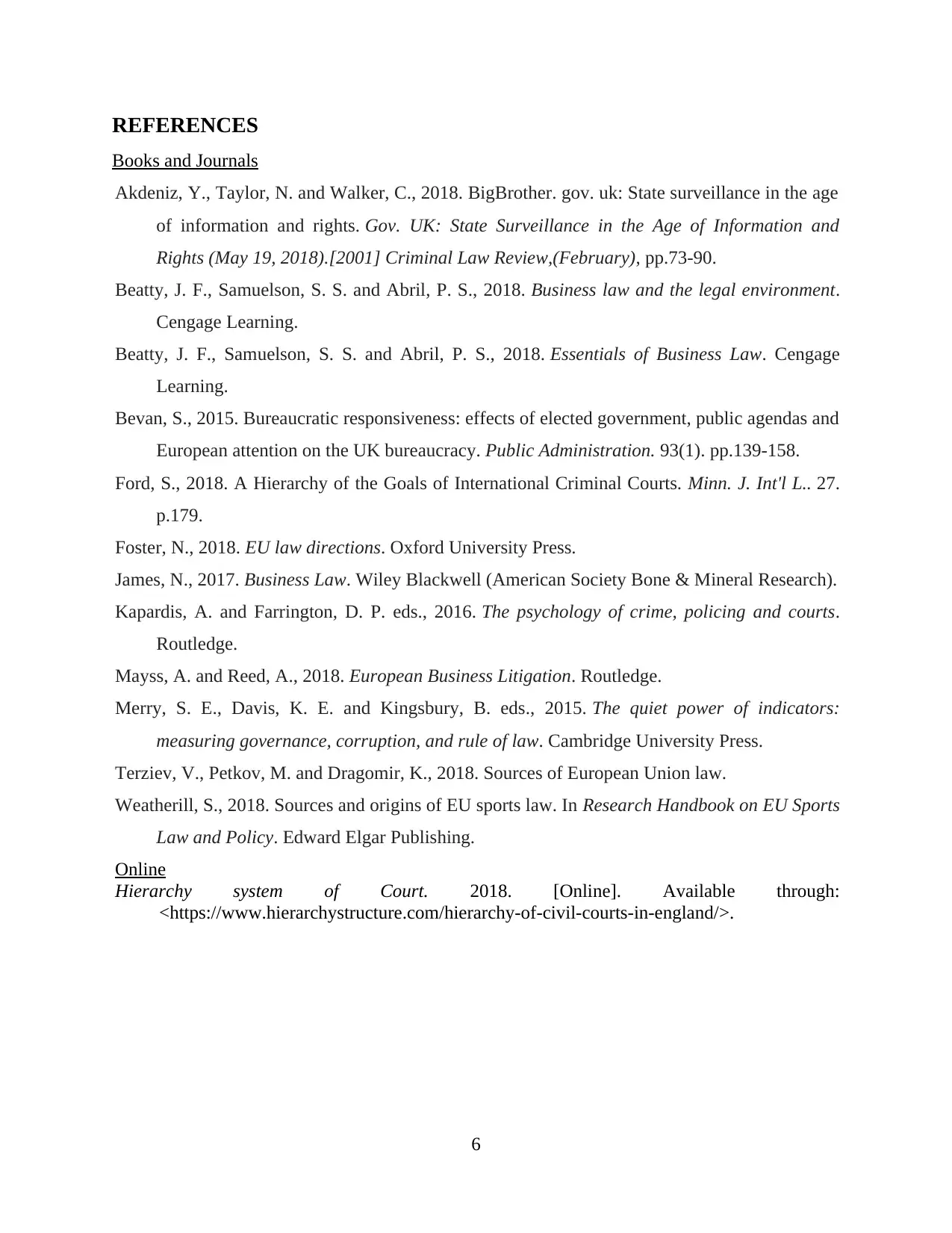
REFERENCES
Books and Journals
Akdeniz, Y., Taylor, N. and Walker, C., 2018. BigBrother. gov. uk: State surveillance in the age
of information and rights. Gov. UK: State Surveillance in the Age of Information and
Rights (May 19, 2018).[2001] Criminal Law Review,(February), pp.73-90.
Beatty, J. F., Samuelson, S. S. and Abril, P. S., 2018. Business law and the legal environment.
Cengage Learning.
Beatty, J. F., Samuelson, S. S. and Abril, P. S., 2018. Essentials of Business Law. Cengage
Learning.
Bevan, S., 2015. Bureaucratic responsiveness: effects of elected government, public agendas and
European attention on the UK bureaucracy. Public Administration. 93(1). pp.139-158.
Ford, S., 2018. A Hierarchy of the Goals of International Criminal Courts. Minn. J. Int'l L.. 27.
p.179.
Foster, N., 2018. EU law directions. Oxford University Press.
James, N., 2017. Business Law. Wiley Blackwell (American Society Bone & Mineral Research).
Kapardis, A. and Farrington, D. P. eds., 2016. The psychology of crime, policing and courts.
Routledge.
Mayss, A. and Reed, A., 2018. European Business Litigation. Routledge.
Merry, S. E., Davis, K. E. and Kingsbury, B. eds., 2015. The quiet power of indicators:
measuring governance, corruption, and rule of law. Cambridge University Press.
Terziev, V., Petkov, M. and Dragomir, K., 2018. Sources of European Union law.
Weatherill, S., 2018. Sources and origins of EU sports law. In Research Handbook on EU Sports
Law and Policy. Edward Elgar Publishing.
Online
Hierarchy system of Court. 2018. [Online]. Available through:
<https://www.hierarchystructure.com/hierarchy-of-civil-courts-in-england/>.
6
Books and Journals
Akdeniz, Y., Taylor, N. and Walker, C., 2018. BigBrother. gov. uk: State surveillance in the age
of information and rights. Gov. UK: State Surveillance in the Age of Information and
Rights (May 19, 2018).[2001] Criminal Law Review,(February), pp.73-90.
Beatty, J. F., Samuelson, S. S. and Abril, P. S., 2018. Business law and the legal environment.
Cengage Learning.
Beatty, J. F., Samuelson, S. S. and Abril, P. S., 2018. Essentials of Business Law. Cengage
Learning.
Bevan, S., 2015. Bureaucratic responsiveness: effects of elected government, public agendas and
European attention on the UK bureaucracy. Public Administration. 93(1). pp.139-158.
Ford, S., 2018. A Hierarchy of the Goals of International Criminal Courts. Minn. J. Int'l L.. 27.
p.179.
Foster, N., 2018. EU law directions. Oxford University Press.
James, N., 2017. Business Law. Wiley Blackwell (American Society Bone & Mineral Research).
Kapardis, A. and Farrington, D. P. eds., 2016. The psychology of crime, policing and courts.
Routledge.
Mayss, A. and Reed, A., 2018. European Business Litigation. Routledge.
Merry, S. E., Davis, K. E. and Kingsbury, B. eds., 2015. The quiet power of indicators:
measuring governance, corruption, and rule of law. Cambridge University Press.
Terziev, V., Petkov, M. and Dragomir, K., 2018. Sources of European Union law.
Weatherill, S., 2018. Sources and origins of EU sports law. In Research Handbook on EU Sports
Law and Policy. Edward Elgar Publishing.
Online
Hierarchy system of Court. 2018. [Online]. Available through:
<https://www.hierarchystructure.com/hierarchy-of-civil-courts-in-england/>.
6
1 out of 8
Related Documents
Your All-in-One AI-Powered Toolkit for Academic Success.
+13062052269
info@desklib.com
Available 24*7 on WhatsApp / Email
![[object Object]](/_next/static/media/star-bottom.7253800d.svg)
Unlock your academic potential
Copyright © 2020–2026 A2Z Services. All Rights Reserved. Developed and managed by ZUCOL.





